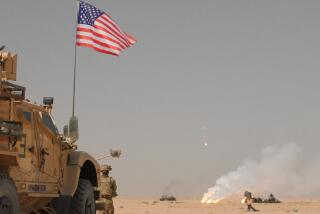Doyle McManus: Afghanistan, our longest war
The war in Afghanistan, our longest war, is well into its 10th year. It claimed the lives of 499 U.S. troops in 2010, and more lives will be lost once the “fighting season” resumes in the spring. The financial cost of the conflict is heading toward $300 million a day.
Yet when the U.S. and NATO commander in Afghanistan, Army Gen. David H. Petraeus, testified before Senate and House committees this week, most of the seats in the public and news media sections were empty. Senators and House members drifted in and out, just as they do in hearings about farm price supports or bank reform. Two demonstrators from Code Pink stood as Petraeus testified, quietly uttered a sentence or two of protest — “The American people don’t support this war” — and left peaceably. It wasn’t so much a disruption as a ritual invocation.
The demonstrators were correct on the facts: The American people don’t support the war. A Washington Post-ABC News poll released this week found that the share of the public that says the war in Afghanistan isn’t worth the costs has risen to a record 64%, and 73% of those polled said they’d like to see a “substantial number” of troops withdrawn this year. But the war isn’t the top issue for most Americans; the economy is. And since on Capitol Hill, at least, most Republicans support the war and most Democrats don’t want to criticize their own president, a temporary truce has settled over the issue.
As a result, Petraeus, who endured stormy hearings in 2007 and 2008 when he was U.S. commander in Iraq, faced few challenging questions in his eight hours before the committees this week. Still, his answers — which he said were intended to be neither optimistic nor pessimistic, merely “realistic” — merit attention.
Are we winning or losing in Afghanistan? Petraeus said we’re no longer losing, but we’re not yet winning either.
“The momentum achieved by the Taliban in Afghanistan since 2005 has been arrested in much of the country and reversed in a number of important areas,” he said. But he also warned that the progress was “fragile and reversible.”
Will he recommend a significant troop withdrawal this year to meet President Obama’s promise of a drawdown beginning in July? Petraeus would only say that he’s still working on “options” to offer his superiors.
But other Pentagon officials have already been clear on this point: There will be a drawdown, but it won’t be major. Officials say they’re working on proposals to withdraw a few thousand noncombat troops from Afghanistan to keep Obama’s promise, but no significant diminution of the combat force is planned.
Moreover, Petraeus made clear that our involvement in Afghanistan is likely to extend beyond the 2014 target the United States and its allies have set for turning over the lead role in combat to Afghan forces that are only now being recruited and trained. The general said talks were already underway about maintaining U.S. and other foreign military forces in Afghanistan after 2014 and turning the giant NATO bases there into “joint facilities.”
“We need to ensure that we take a sufficiently long view to ensure that our actions in the months ahead enable long-term achievement in the years ahead,” he said. “We are also now beginning to look beyond 2014…. This is enormously reassuring to our Afghan partners and of considerable concern to the Taliban.”
Petraeus gave a now-familiar report on the biggest problem we face: the inability of Afghanistan’s notoriously corrupt and inefficient government to take advantage of the security that U.S. troops are providing and regain the popular legitimacy it has lost.
“There is no question that governmental capacity is an area of … strategic risk,” Petraeus said carefully. More eloquent was the 20-page sheaf of full-color PowerPoint slides he provided. On the military side, it provided statistical evidence that security in much of Afghanistan is improving. On the civilian side, it offered a picture of a rebuilt mosque, along with a warning that “inadequate governance” posed a major strategic risk.
Petraeus was clear in stating that 2011 would be as tough a year in combat as 2010 was, and that the Taliban breaking point, if there is one, has not yet been found.
But he expressed hope that at some point the Taliban will divide and a significant number will opt to negotiate with President Hamid Karzai’s government.
A few dissidents did speak up on Capitol Hill this week. At the House Committee on Armed Services on Wednesday, renegade North Carolina Republican Rep. Walter B. Jones erupted: “Fifteen, 16, 17 years! For God’s sake, how much more can we take?”
Petraeus had a ready response: “I understand the impatience of the U.S. people,” he said. “I’m impatient.”
Sen. Kirsten Gillibrand (D-N.Y.) said she wants a quicker drawdown and called for legislation to force Obama to set a final withdrawal date. And Sen. Jim Webb (D-Va.) said that though he supports seeing this war through, the long-term lesson should be that large-scale counterinsurgency isn’t sustainable.
The Congressional Progressive Caucus held a separate meeting — not an official hearing — at which 11 dovish House members denounced the war.
But they were voices in the wilderness. A majority of the American people may oppose the war, but the political class seems quite comfortable at this point to let the president and the generals pursue it as they see fit — at least until 2014, halfway through the next presidential term.
More to Read
A cure for the common opinion
Get thought-provoking perspectives with our weekly newsletter.
You may occasionally receive promotional content from the Los Angeles Times.











